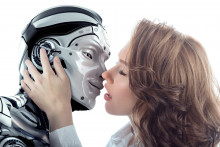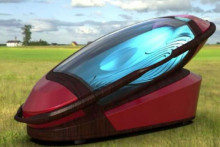Sex robots have been described both as sophisticated sex toys and automated companions capable of improving our quality of life. But can we really get intimate with robots? And how will they reshape our interactions with other humans? We spoke with Master students Alessandro Capra (Human Media Interaction) and Alessio Gerola ( Philosophy of Science, Technology and Society) about the implications of this increasingly popular technology.
Will it be possible for humans to interact with sex robots with complete intimacy? How would interacting with them differ from interacting with a human?
Capra: ‘Sex always sells! To me, it’s not a question of if we will have intimate relations with robots, but rather when it’s going to happen. For the moment, you would still be quite aware that you are having sex with a robot because they still look and feel very much like machines. But it’s simply a matter of time until sex with humans and sex with robots become easily comparable. We went to the moon. We are certainly capable of making a robot feel like a human.’
Gerola: ‘The sensorial part of sex robots is still very underdeveloped, and such aspect certainly plays a significant role in determining whether the interaction with the sex robot resembles a relationship with a human. Nonetheless, I wouldn’t say this is the only aspect that matters for intimacy. People can develop intimate relationships with inanimate objects, for example, certain Japanese people who want to marry virtual avatars. It seems that mere physical appearance is not always an obstacle to having a meaningful relationship with something.’
When did humans become so intimate in their relations to technologies?
Capra: ‘I believe this happens when the object acquires more meaning to us. For example, photography is simply technology. But a photograph of your grandmother holds more meaning to you than it does as a mere object. As for a sex robot, will we see it as an object of pleasure and use it for our own gratification, or will we start developing a sort of relationship with them?’
What would such human-robot relationships look like?
Gerola: ‘I think the way sex robots will be used will depend on how they start fitting into society: whether they become a more extreme version of porn and are considered as the top-level experience of masturbation with sex toys, or whether they are recognized more as providers of companionship. They may be used as additions to regular sex, or there may even be people who prefer having sex with robots over having it with humans.’
Capra: ‘Perhaps for people who struggle with finding and maintaining romantic relationships and thus lack affection from others, sex robots could become a valid substitute.’
Gerola: ‘And if we think of sex robots as substitutes, perhaps they are even better substitutes than some options being used today, such as porn. I could even see governments subsidizing these robots for people who have a certain physical or psychological condition that doesn’t allow them to have such interactions with humans.’

Do you think every human has a right to intimacy, to have sex, or to not be lonely? If so, would sex robots be a solution for that?
Gerola: ‘I don’t hold a naturalistic view of rights which maintains they are objective things that exist in society. Rather, I see rights as socially constructed and subjective, a result of what we collectively agree is important to offer to individuals. The question then becomes, ‘would it be useful to recognize intimacy as a right?’ Phrasing the question in this way, I would answer that yes, it would be useful for those who desire intimate interactions. But it might be enough to make intimacy more accessible without necessarily considering it a right.’
How can sex robots have an impact on our human to human interactions?
Capra: ‘To always have something available to satisfy your desires takes away a large part of the fun. It’s a thrilling challenge to try to get a girl or guy, and doing so develops your social skills. But having something that easily accessible creates a comfort bubble around you, which could harm your ability to behave socially with others and deal with human issues that come with having relationships.’
Gerola: ‘A human relationship balances the wants and desires of both partners. A human-robot relationship can easily turn into the robot fulfilling all of the human’s wants and desires. Since these interactions are a reflection of ourselves and shape the way we act, it’s not unlikely that we might, in turn, try to interact in the same way with other humans.’






